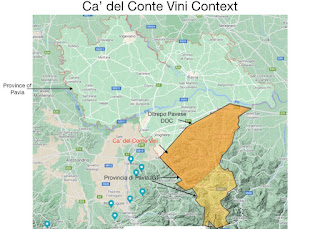Timorasso wines have been, up to this time in my research, a purely Piemontese exercise: 46 Colli Tortonesi producers; 14 non-Colli-Tortonesi producers who, nonetheless, source their grapes from the region; and four non-Colli-Tortonesi producers who source their grapes from elsewhere in Piemonte. That is, until I encountered Ca' del Conte, an Oltrepo-Pavese-based estate that produces a 100% Timorasso wine under the Bianco Provinicia di Pavia label. To add to its uniqueness, Noah is a skin-fermented Timorasso wine.
Ca' del Conte, founded in 2003 by Paolo and Martina Macconi, is located in the Municipality of Rivanzanno Terme in the early part of the Oltrepo Pavese hills (The age of most of the vines suggests that Ca' del Conte was founded on a pre-existing vineyard.). The estate covers 20 ha, 16 of which are devoted to vines, with the remainder woods, fruit trees, and a vegetable garden.
The soil originated in the Messinian-Tortonian period and is primarily marl -- clayey consistency on the surface and aranaceous-sandy at depth -- with sulphurous infiltrations.
Varieties planted on the property include Pinot Noir, Chardonnay, Pinot Grigio, and Riesling -- planted in the 1970s and trained Geneva Double Curtain -- as well as the more recently planted Pinot Bianco and Timorasso.
The vineyard has been farmed organically since 2017 and is currently Bios-certified. The spaces between the vine rows are grassed. Grass length is managed by periodic mowing as well as tilling of the soil around the vine roots. No synthetic chemicals are used in the vineyard. Instead, vines are fertilized with manure and pathogens controlled by biological means or with the application of copper and/or sulfur.
Vines are pruned in the winter and during the vegetative cycle. Materials from the winter prunings are shredded and dispersed in the vineyards.
The Timorasso vineyard was planted in 2015 on material from a recent landslide. The landslide brought arenaceous soils with a high degree of limestone and skeleton into play. The vineyard is north-facing and sits at 320 meters above sea level.
The Ca' del Conte Noah is a skin-fermented white wine. Skin-fermented white wines are treated in the same manner as are red wines; that is, fermentation of the juice in the presence of grape skins, seeds, and, in some cases, stems. The key difference between these wines and conventional white wines are the extractives from the skins, seeds, and stems (if stems are included). The key difference between these wines and skin-contact wines are the greater concentration of extractives from the skin and the extractives from the seeds and, if utilized, the stems.
The grapes for this wine are selected and harvested manually after which they are transported to the winery in 18 kg boxes. The grapes are crushed and destemmed before being placed into stainless-steel tanks for spontaneous fermentation. There is no temperature control during fermentation as the intent is to facilitate extraction. The wine remains in contact with the skins for 30 days post-fermentation. At the end of the maceration period, the wine is racked into fiberglass containers for 1 year of aging. There is no filtering prior to bottling.
I tasted the 2018 vintage of Noah. This wine is labeled Bianco Provincia di Pavia even though the estate lies within the bounds of Oltrepo Pavese DOC.
Rust colored. Vanilla, coconut, burnt orange, tea, and a nuttiness on the nose. Shambolic on the palate when tasted initially. Sour cherry on the attack followed by outcroppings of perfume, dried herbs, and pale citrus drink. Residual sugar and volatile acidity present, along with sapidity and a spiciness. A mineral coating on the finish.
In time, the wine settles into a more evenly balanced character with lime- and orange-aid flavors added, a mineral coating on the tongue, and a drying finish. It became rather pleasurable to drink, actually



No comments:
Post a Comment